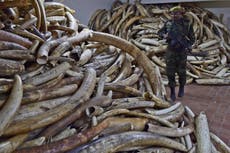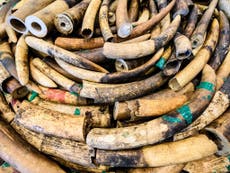Halt EU ivory trade to save elephants, ministers tell commission
Officials face pressure to stop dragging their feet, in drive to save animal from extinction
Your support helps us to tell the story
From reproductive rights to climate change to Big Tech, The Independent is on the ground when the story is developing. Whether it's investigating the financials of Elon Musk's pro-Trump PAC or producing our latest documentary, 'The A Word', which shines a light on the American women fighting for reproductive rights, we know how important it is to parse out the facts from the messaging.
At such a critical moment in US history, we need reporters on the ground. Your donation allows us to keep sending journalists to speak to both sides of the story.
The Independent is trusted by Americans across the entire political spectrum. And unlike many other quality news outlets, we choose not to lock Americans out of our reporting and analysis with paywalls. We believe quality journalism should be available to everyone, paid for by those who can afford it.
Your support makes all the difference.EU commissioners are under pressure to close Europe’s legal ivory trade, which is a major threat to elephants.
The EU is the world's largest exporter of legal ivory to Asian markets compared with other countries, and conservationists have accused the bloc of dragging its heels over the trade.
Sales of ivory fuel poaching and are driving elephants towards extinction.
Now European environment ministers are calling on the commission to draw up proposals to close the EU ivory trade market, according to the Wildlife Conservation Society EU.
A consultation with stakeholders will be launched next week, according to Future for Elephants, a Germany-based group that lobbies for a global ivory trade ban.
Many countries, including the US, UK, China and France, have closed their domestic ivory markets, but Europe and Japan have not done so and are accused of still bolstering the killing of elephants.
The international trade was officially banned in 1989 but trade in antique ivory and shipments of “personal effects for non-commercial purposes” are allowed. These loopholes are exploited by EU traders. The commission says the EU’s legal antique ivory trade has no influence on new poaching levels.
But analysis of ivory seizures has shown that the trade is widely used as a cover for ivory from recently poached animals.
WWF says 90 per cent of African elephants have been wiped out in a century mainly because they are killed for their ivory tusks to meet growing demand for ivory in China and the Far East.
Poaching has risen in parts of Africa in the past 10 years, with 20,000 African elephants killed every year for their ivory - around 55 every day, or one every 25 minutes.
The African Elephant Coalition, a coalition of 32 African states, has previously called on the EU to follow through on promises to ban the domestic ivory trade.
The European Commission conducted a public consultation in 2017 on a proposed ivory trade ban, leading to almost 90,000 responses – one of the highest number to any consultation – at least 90 per cent of which backed a ban. However, nothing has yet come of it, and in 2018 it backtracked on plans for a total ban.
The EU’s biodiversity strategy for 2030, published last year, included a “further tightening of the rules on EU ivory trade later this year”, and the European Commission then issued proposals. But critics say they fall short of closing the EU ivory market.
They say the proposals only tighten trade for pre-1947 worked items.
Last year experts from the International Fund for Animal Welfare, who met European Commission officials, said they were “taking steps to align the EU’s stance with the global shift towards closure of domestic ivory markets, and had suggested pragmatic measures to achieve this”.
A study this summer published in Nature concluded that contrary to some reports, elephant poaching has not diminished across most of Africa since 2011.
Cameroon customs were reported this week to have made their largest seizure of smuggled elephant tusks in recent years. They uncovered 626kg of smuggled ivory, amounting to 118 elephant tusks, China Global Television Network reported. The find suggested about 59 elephants had been killed.
Officials said the central African nation was “struggling to dismantle an international ivory smuggling gang and contain a surge in poaching”.







Join our commenting forum
Join thought-provoking conversations, follow other Independent readers and see their replies
Comments